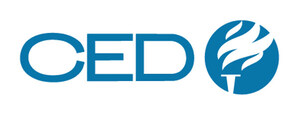
News provided by
Committee for Economic Development of The Conference Board (CED)Jul 13, 2021, 12:57 ET
NEW YORK, July 13, 2021 /PRNewswire/ -- From the fallout of COVID-19 to the Suez Canal incident to the increasing tensions with China, recent crises have exposed the myriad challenges to America's reliance on global supply chains, prompting economic and security concerns about the reliability and resiliency of these international trade channels. To help both businesses and policymakers manage the challenges posed by global supply chains in the postpandemic economy and ensure the US remains an innovative and competitive leader on the world stage, the Committee for Economic Development of The Conference Board (CED) has issued a new report, Global Supply Chains: Compete, Don't Retreat.
As detailed in the report – the latest in a series of Solutions Briefs on Sustaining Capitalism – widespread, reoccurring supply chain failures pose five fundamental threats to the nation's safety and prosperity: risks to national security; economic disruption; reduced economic growth from denial of access to technology; predatory pricing following monopoly power; and threats to overall public health. Failure to address these glaring limitations now could have very serious consequences.
"Global trade in materials, tools, components, and services deserves an immediate assessment of both security and economic needs for the long term," said Lori Esposito Murray, President of CED. "Given the size of China's economy, its extensive role in global supply chains, its growing military strength, and the growing tensions in its bilateral US relationship, China is at the nexus of these major concerns about supply chain resilience. Security with prosperity must be the goal of any strategy to manage our supply chains."
In its new Solutions Brief, CED offers five recommendations through which public and private decisionmakers could maintain much of the cost savings provided by successful global supply chains, at the minimum economic and security risk. They include:
- Cultivate additional sources of materials or intermediate inputs: Relying on a single source (or multiple sources from a single geographic region) of any essential input, whether simple or sophisticated, expensive or cheap, entails risk. Businesses must assess the security of their supply chains and seek alternative domestic sources. At the governmental level, the United States should work with allies to cooperate when supply chains are interrupted, and to enforce free and fair trade and environmental rules, should nonmarket economies engage in "industrial policies" and subsidize production or degrade the environment to cut costs and gain a competitive advantage.
- Build stockpiles: To prepare for a larger-scale supply interruption, or for an interruption that affects national security or public health, public stockpiles may be necessary. Private inventories at some level of the production supply chain must also be adequate. The US already stockpiles key public health and national security materials and goods that have comparatively long shelf lives. Now we must learn to do better, including monitoring the types, quantities, and the useful lives of stockpiled goods. The nation can safely import stockpiled goods in times of safety – cutting off cost-saving global supply chains to buy domestic in times of safety is wasting money, and in the instance of scarce raw materials could "drain America first." To combat this, international cooperation will be essential.
- Invest in research and development (R&D): The US government's funding for R&D has lagged. Technological progress through research can potentially reveal alternative materials to circumvent supply risks in some applications. To remain competitive, the United States also needs a strong talent base, which requires taking full advantage of our nation's unparalleled attractiveness to talented workers from all around the world, our world-class higher education institutions, and the postpandemic opportunity to train a highly skilled workforce.
- Invest in production: Manufacturing capacity for goods that truly support national security or public health and that cannot be stockpiled in sufficient quantity may need to be maintained, even if unprofitable. Such a decision must cross a very high bar, which must not be lowered by rent-seeking by powerful private interests. Contingency planning for another global pandemic, in which importing foreign-produced supplies like surgical masks cannot be counted upon, may require prior arrangements with US manufacturers to undertake surge production, potentially with public subsidies to maintain such facilities.
- Maintain standby production facilities: If the probability of a catastrophic national security or public health event is high enough, it might be necessary for public funds to build and maintain production capacity on a standby basis, or to subsidize private backup capacity. The potential costs of any rupture in a global supply chain would need to be considerable to justify such an extreme remedy.
The new Solutions Brief, Global Supply Chains: Compete, Don't Retreat, can be accessed here.
About CED
The Committee for Economic Development of The Conference Board (CED) is the nonprofit, nonpartisan, business-led public policy center that delivers well-researched analysis and reasoned solutions in the nation's interest. CED Trustees are chief executive officers and key executives of leading US companies who bring their unique experience to address today's pressing policy issues. Collectively they represent 30+ industries, over a trillion dollars in revenue, and over 4 million employees. www.ced.org
About The Conference Board
The Conference Board is the member-driven think tank that delivers trusted insights for what's ahead. Founded in 1916, we are a non-partisan, not-for-profit entity holding 501 (c) (3) tax-exempt status in the United States. www.conference-board.org
SOURCE Committee for Economic Development of The Conference Board (CED)






Share this article